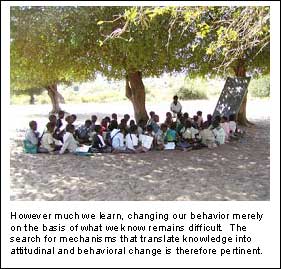The possession of knowledge per se does not necessarily result in behaviors that reflect such knowledge. Nowhere is this clearer than in how humans take care, or rather do not take care, of their health. Knowledge about what causes the transmission of the Human Immunodeficiency Virus (HIV), for instance, has only a limited impact on avoiding unprotected sex. Knowing that smoking is bad for your health does not as such result in giving up or even altering smoking habits. The availability of messages about healthy and unhealthy eating habits does not automatically make us eat better. And, while everyone knows that prolonged unprotected exposure to the rays of the sun while sunbathing may cause skin cancer, beaches are still crowded with those who perfectly well know but who reason that, while some may be at risk, it's unlikely that they will fall victim.
 Beyond
what we do as individuals, similar processes seem to determine
inappropriate social behavior. Despite all we know, we do not
only take appropriate care of ourselves, we show similar negligence
for the well being of other people, our common environment, and
the planet as a whole.
Beyond
what we do as individuals, similar processes seem to determine
inappropriate social behavior. Despite all we know, we do not
only take appropriate care of ourselves, we show similar negligence
for the well being of other people, our common environment, and
the planet as a whole.
This focus area of research and development is concerned with questions regarding how we can bridge the gap between what we know and what we do. HIV/AIDS is an important dimension of this area. The study of how humans behave vis à vis the threat of HIV/AIDS responds to acute problems, particularly in developing nations. We have thus chosen to single this area out for priority attention and provide a concept paper on 'contributing to the fight against HIV/AIDS in developing countries' as a prompt to start building a community of practice and thinking around this crucial issue in the perspective of LDI's concerns.
Principal investigator for this focus area is Muriel Visser.